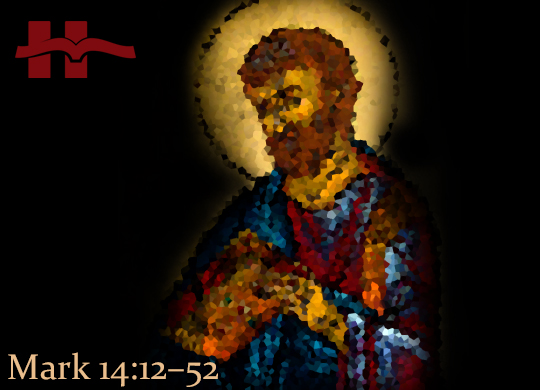Mark 14:12−52

Faithfulness in discipleship, emulating Jesus, involves submission to God’s sovereignty, in prayerful dependence upon the Holy Spirit.
“Be alert and pray that you may not come into temptation;
the Spirit is willing, but the flesh is weak.”
Mark 14:37–38
In Mark 13:35, Jesus declared, “Therefore, be on the alert, for you do not know when the lord of the house is coming—whether in the evening or midnight or at cockcrow or early in the morning.” These time stamps—“evening,” “midnight,” “cockcrow,” and “early morning”—are significant, for the same four-watch scheme shows up in the Passion account: 14:17, 37-42, 68 and 72, and 15:1. Quite suddenly, after 14:17, Mark seems particularly interested in timing events, running the clock until Jesus is buried. His goal is to portray, in each of the four watches, Jesus as the positive example of faithfulness to counter the disciples’ negative one: Jesus succeeds; the disciples fail. “Evening” and “midnight” are depicted in this section.
The whole operation of the preparation for Passover (14:12–16) gives a distinct sense that everything is scripted! This is also evidenced in the dialogs at the Last Supper and afterwards (14:17–31). Undergirding the entire account is God’s control: everything happens as it has been written about (14:21, 27, 49). Despite the approach of ominous, dark clouds on the horizon, the disciple must remain confident in God’s sovereign control over all things, just as Jesus was. But the Twelve would not be so trusting: they would all fall away (14:27), despite Peter’s swaggering bluster (14:29). And Jesus puts him in his place: instead of denying themselves, as he had exhorted them to do (8:34), they (Peter, in particular) would be denying Jesus (14:30), with a crowing cock as an eloquent witness to Peter’s unfaithfulness. That was the “evening” watch.
Subsequently, Jesus’ three sessions of prayer are balanced by his three disciples’ falling into sleep three times, despite his explicit exhortation to them to be alert (14:37, 40, 41). Jesus, then, is the faithful counterpart of the failing disciples, as he remains alert and engaged in prayer in this time of grave crisis. His faithfulness to his Father remains unabated; his submission to divine will and purpose, unquestioned. In the Garden, he acquiesces to the Father’s will (14:36): he remains faithful, unlike the disciples who are fast asleep.
Jesus is then arrested. Thus far in the Gospel, Jesus and disciples have been close together. From this point onwards, following his arrest, the ones Jesus had chosen to be “with Him” (3:14) are no longer around; they abandon him totally. One of them, in 14:43–46, betrays him. The description of Judas as “one of the Twelve” (14:43) is redundant, but it serves to reinforce the magnitude of his treason.
In other words, in this episode (including the betrayal by Judas and the fleeing of the disciples, 14:50), all of the Twelve and all of the religious authorities (exemplified by the one who got his ear lobe chopped off, 14: 47) are equally shown to be unworthy of their offices and designations. All of this depicts for readers the seriousness of unfaithfulness to Jesus in the “midnight” watch (Jesus returned to his disciples thrice in the Garden, ostensibly at hourly intervals, making the events of his arrest happen at “midnight”).
Another cameo follows, this time symbolizing once more the failure of these disciples and their unfaithfulness to Jesus (14:51–52). For this see here.
Jesus remains the model of faithfulness. Whom will we be like—Jesus or the failing disciples?












 Abe Kuruvilla is the Carl E. Bates Professor of Christian Preaching at The Southern Baptist Theological Seminary (Louisville, KY), and a dermatologist in private practice. His passion is to explore, explain, and exemplify preaching.
Abe Kuruvilla is the Carl E. Bates Professor of Christian Preaching at The Southern Baptist Theological Seminary (Louisville, KY), and a dermatologist in private practice. His passion is to explore, explain, and exemplify preaching.